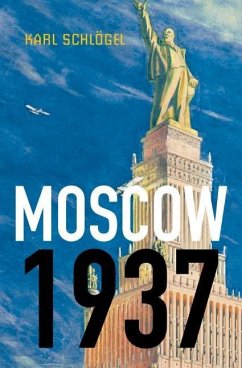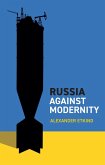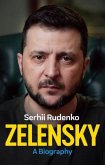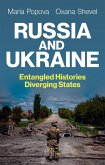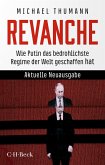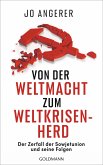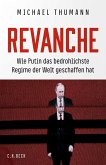Karl Schlögel
Moscow, 1937
Schade – dieser Artikel ist leider ausverkauft. Sobald wir wissen, ob und wann der Artikel wieder verfügbar ist, informieren wir Sie an dieser Stelle.
Karl Schlögel
Moscow, 1937
- Gebundenes Buch
- Merkliste
- Auf die Merkliste
- Bewerten Bewerten
- Teilen
- Produkt teilen
- Produkterinnerung
- Produkterinnerung
Moscow, 1937: the soviet metropolis at the zenith of Stalin's dictatorship. A society utterly wrecked by a hurricane of violence.
In this compelling book, the renowned historian Karl Schlögel reconstructs with meticulous care the process through which, month by month, the terrorism of a state-of-emergency regime spiraled into the 'Great Terror' during which 1 million human beings lost their lives within a single year. He revisits the sites of show trials and executions and, by also consulting numerous sources from the time, he provides a masterful panorama of these key events in Russian…mehr
Andere Kunden interessierten sich auch für
![Russia Against Modernity Russia Against Modernity]() Alexander EtkindRussia Against Modernity14,99 €
Alexander EtkindRussia Against Modernity14,99 €![Zelensky Zelensky]() Serhii RudenkoZelensky18,99 €
Serhii RudenkoZelensky18,99 €![Russia and Ukraine Russia and Ukraine]() Maria PopovaRussia and Ukraine18,99 €
Maria PopovaRussia and Ukraine18,99 €![A Green and Global Europe A Green and Global Europe]() Nathalie TocciA Green and Global Europe65,99 €
Nathalie TocciA Green and Global Europe65,99 €![Revanche Revanche]() Michael ThumannRevanche16,00 €
Michael ThumannRevanche16,00 €![Von der Weltmacht zum Weltkrisenherd Von der Weltmacht zum Weltkrisenherd]() Jo AngererVon der Weltmacht zum Weltkrisenherd24,00 €
Jo AngererVon der Weltmacht zum Weltkrisenherd24,00 €![Revanche Revanche]() Michael ThumannRevanche25,00 €
Michael ThumannRevanche25,00 €-
-
Moscow, 1937: the soviet metropolis at the zenith of Stalin's dictatorship. A society utterly wrecked by a hurricane of violence.
In this compelling book, the renowned historian Karl Schlögel reconstructs with meticulous care the process through which, month by month, the terrorism of a state-of-emergency regime spiraled into the 'Great Terror' during which 1 million human beings lost their lives within a single year. He revisits the sites of show trials and executions and, by also consulting numerous sources from the time, he provides a masterful panorama of these key events in Russian history.
He shows how, in the shadow of the reign of terror, the regime around Stalin also aimed to construct a new society. Based on countless documents, Schlögel's historical masterpiece vividly presents an age in which the boundaries separating the dream and the terror dissolve, and enables us to experience the fear that was felt by people subjected to totalitarian rule. This rich and absorbing account of the Soviet purges will be essential reading for all students of Russia and for any readers interested in one of the most dramatic and disturbing events of modern history.
In this compelling book, the renowned historian Karl Schlögel reconstructs with meticulous care the process through which, month by month, the terrorism of a state-of-emergency regime spiraled into the 'Great Terror' during which 1 million human beings lost their lives within a single year. He revisits the sites of show trials and executions and, by also consulting numerous sources from the time, he provides a masterful panorama of these key events in Russian history.
He shows how, in the shadow of the reign of terror, the regime around Stalin also aimed to construct a new society. Based on countless documents, Schlögel's historical masterpiece vividly presents an age in which the boundaries separating the dream and the terror dissolve, and enables us to experience the fear that was felt by people subjected to totalitarian rule. This rich and absorbing account of the Soviet purges will be essential reading for all students of Russia and for any readers interested in one of the most dramatic and disturbing events of modern history.
Produktdetails
- Produktdetails
- Verlag: Wiley & Sons
- Artikelnr. des Verlages: 1A745650760
- 2. Aufl.
- Seitenzahl: 650
- Erscheinungstermin: 27. August 2012
- Englisch
- Abmessung: 236mm x 167mm x 63mm
- Gewicht: 1120g
- ISBN-13: 9780745650760
- ISBN-10: 0745650767
- Artikelnr.: 35676034
- Herstellerkennzeichnung
- Libri GmbH
- Europaallee 1
- 36244 Bad Hersfeld
- gpsr@libri.de
- Verlag: Wiley & Sons
- Artikelnr. des Verlages: 1A745650760
- 2. Aufl.
- Seitenzahl: 650
- Erscheinungstermin: 27. August 2012
- Englisch
- Abmessung: 236mm x 167mm x 63mm
- Gewicht: 1120g
- ISBN-13: 9780745650760
- ISBN-10: 0745650767
- Artikelnr.: 35676034
- Herstellerkennzeichnung
- Libri GmbH
- Europaallee 1
- 36244 Bad Hersfeld
- gpsr@libri.de
Karl Schlögel is Professor of Eastern European History at the European University Viadrina in Frankfurt.
Preface x
Acknowledgements xiii
Reproduction Acknowledgements xvii
Translator's Note xx
Introduction 1
1 Navigation: Margarita's Flight 10
Margarita's fl ight - Manuscripts don't burn: a writer in 1937 - Relief map
of the city, locations, staging posts - Dramatis personae and their
portrayal: dual characters - NKVD, the organization - 'People vanished from
their apartments without trace' - Sudden deaths, execution as spectacle -
'It can't be!'
2 Moscow as a Construction Site: Stalin's General Plan in Action 33
Aleksandr Medvedkin's film New Moscow - A new cityscape: Stalin's General
Plan for the Reconstruction of Moscow - Moscow as a construction site:
between demolition and new construction - Moscow beyond the ring roads -
Human landscape, struggle for survival
3 A Topography of the Disappeared: The Moscow Directory of 1936 54
Snapshot of the status quo: directories as documents of their age -
Topography of power and other locations - Traces of the disappeared - Lists
of people to be shot and the posthumous reconstruction of their addresses
4 The Creation of Enemies: The Criminal Prosecution of the
Trotskyite-Zinovievite Terrorist Centre, 19 - 24 August 1936 68
World-historical criminal cases: the rhetoric of the fi rst Moscow show
trial - The echo of violence: how a latent civil war comes to be
articulated in language - 'Double-dealers' - The birth of the show trial
from the spirit of lynch-law - The ideal enemy
5 'Tired of the Effort of Observing and Understanding': Lion Feuchtwanger's
Moscow 1937 81
A key scene in European intellectual history: Feuchtwanger's meeting with
Stalin - The impotence of the anti-fascist movement: how to generate a
point of view - The end of the fl âneur: journey in the shadow of the NKVD
- The phenomenology of confusion and the creation of unambiguous meaning:
credo quia absurdum - Leave-taking at Belorusskii Station
6 In the Glare of Battle: Spain and Other Fronts 95
Moscow maps: the scene is Spain - A world in meltdown, war scare - The
Soviet nation as a patriotic fi ghting unit - Metastases: show trial in
Barcelona, the NKVD abroad - Barcelona transfer: Moscow experiences
7 Blindness and Terror: The Suppressed Census of 1937 109
A journey into the interior of society - 6 January 1937: snapshot of an
empire - Ten years after the census of 1926: balance sheet after the Great
Leap Forward - Self-analysis, self-education, data acquisition - The shock
of the missing millions - Statistics as crime
8 A Stage for the Horrors of Industrialization: The Second Moscow Show
Trial in January 1937 125
'The Business-like atmosphere' - The language of expert witnesses - The
topography of the Five-Year Plan - Human sacrifi ce, nemesis, chorus -
Postscript
9 'A Feast in the Time of Plague': The Pushkin Jubilee of 10 February 1937
144
The New York Times: 'All Russia was Pushkin-mad today' - 'Comrade Pushkin':
consecration of a classic - A feast in the time of plague: coded discourses
- Platitudes of a new culture - Russian genius and imperial rule
10 Public Death: Ordzhonikidze's Suicide and Death Rites 160
The shock: Sergo is dead - Escape into ritual - Suicide as a weapon - A
hopeless situation and protest - Death as a group experience: speaking of
death in times of mass murder
11 The Engine Room of the Year 1937: The February-March Plenum of the
Central Committee 177
A leadership at its wits' end: the voice of panic - Testing the limits and
exceeding them: the Party indicts Bukharin and Rykov - The shock:
'universal, free, secret elections' - Audit report: ungovernability and
fear of chaos - Wreckers at work in the NKVD - The dissolution of the Party
and the creation of a new one - Setting the machinery in motion
12 Moscow in Paris: The USSR Pavilion at the International Exhibition of
1937 198
The exhibition trail: a journey through the map of the Soviet Union - The
theme park of twentieth-century civilization - Marginal encounters
13 Red Square: Parade Ground and Place of Execution 209
14 Chopin Concert and Killing Ritual: Radio and the Creation of the Great
Community 215
Radiofi katsia: the two faces of progress - Radio as the background noise
of the new age - The sphere of feelings - Radio listeners as 'citizens of
the world' - Stalin: the original soundtrack: the direction of the
historical moment - Wreckers at work in the ether
15 Soviet Art Deco: Time Preserved in Stone 229
The First All-Union Congress of Architects, 16-26 June 1937 - Moscow as a
building site - Chaos and stress - The Soviet universe as exhibition - The
creation of a new style during a state of emergency - Closing speech: Frank
Lloyd Wright
16 'Brown Bodies, Gaily Coloured Shorts': Sports Parade 248
'The glorious beauty of young people' - Fizkul'turnik, fi zkul'turnitsa:
icons of the new age - 'Stalin's tribe': tableaux vivants in Red Square
17 Wealth and Destruction: The Seventeenth International Geology Congress
in Moscow 256
The emergence of Soviet geologists: science and the dream of an affluent
nation - Pioneers the nation does not need: geologists as enemies of the
people - Vladimir Vernadskii: a patriot without fear - Excursion to the
Moscow-Volga Canal: science and slave labour
18 A City by the Sea: The Opening of the Moscow-Volga Canal 274
After the White Sea Canal: Stalin's second arterial highway - A canal as a
Gesamtkunstwerk: the aesthetics of a man-made riverscape - Dmitlag, the
Gulag Archipelago at the gates of the capital: the parallel society of the
camp zone - Perekovka/ reforging: the laboratory of the new man - 'I have
seen a country that has been transformed into one great camp'
19 Year of Adventures, 1937: A Soviet Icarus 294
Triumphs, records: a city in a fever - Non-stop to America - The conquest
of the Arctic - Twentieth-century adventures - Heroes of the age: Stalin's
aviators - 'There are thousands of dreamers like me' - 'Bolshevik
romanticism' and terror
20 Moscow as Shop-Window: The Abundance of the World, Hungry for Goods and
Dizzy with Hunger 314
André Gide: on luxury and shortages - Advertisements, window displays:
objects of desire and how to present them - Dizzy with hunger - A hopeless
struggle: a nation of speculators - The queue as grapevine
21 Open Spaces, Dream Landscapes: Cruising on the Volga, Holidaying on the
Red Riviera, Conspiracies in the Dachas 326
22 The National Bolshevik Nikolai Ustrialov: His Return Home and Death 332
Returning home from exile: establishing contact with the new Russia -
National Bolshevism and Stalin's 'Socialism in One Country' - The world of
'former people' and 1937 - A double reading: a diary with comments by the
NKVD
23 Celebrating the October Revolution on 7 November 1937 344
In the diplomats' box - Conversations in the inner circle of power
24 A Miniature of High Society before the Massacre 355
The bombs come closer - Beau monde, illustrious society - Masked ball at
the American Embassy - Interior with piano and nursemaid - Yezhov's salon:
art and the secret police - Postscript: inventory of luxury and fashion
25 Soviet Hollywood: Miracles and Monsters 372
Lenin in October: the Revolution corrected - The USSR as a land of film,
picture palaces and stars - Mosfi lm 1937: chaos in the film factory -
Volga-Volga: directors as conspirators, actors as spies - Terror and good
entertainment
26 Death in Exile 387
Dimitrov's diary: a record of self-destruction - Vanishing point Moscow:
biotope - Foreign comrades - Vulnerability: world communism as world
conspiracy - Lists, dossiers and card indexes
27 Arcadia in Moscow: Stalin's Luna Park 404
'A centre of culture and rest' - 'What a summer!' - The locus of public
opinion
28 'Avtozavodtsy': The Workforce of the Stalin Car Factories 413
'Shanghai': city of immigrants, city on the periphery - Ivan Likhachev,
captain of industry - Factory patriotism: the factory as melting pot -
'Mass criticism', or the orchestration of hatred and despair
29 Dzhaz: The Sound of the Thirties 433
Dzhaz (Utesov) - Songs for the masses (Dunaevskii) - Classical music
(Shostakovich)
30 Changing Faces, Changing Times 444
31 America, America: The Other New World 450
Ili' a Il' f and Evgenii Petrov's journey to America - Special relations:
Soviet Americanism and the New Deal - The American way of life in 1937 -
Utopia as present-day reality
32 'I Know of No Other Country . . .': 1937 and the Production of Soviet
Space 463
The birth of the Soviet Union from the spirit of songs for the masses -
Moscow as an image-making machine - Homogenizing labour: purges and the
unity of the Soviet nation
33 The Butovo Shooting Range: Topography of the Great Terror 472
Looking for traces: the archaeology of the graveyard - Mass murder on the
outskirts of the city - Sociology of the mass grave - Killing by quota:
Order No. 00447 - World war, civil war
34 Lonely White Sail . . .: Dreamtime, Children's Worlds 505
35 Yezhov at the Bolshoi Theatre: Celebrating Twenty Years of the Cheka 510
At the heart of Moscow: power made visible - Celebratory speeches and music
between the mass murders - Ovations for the executioners: morituri salutant
36 Bukharin Takes his Leave 519
Bukharin's final plea - The show trial: exercises in dialectics - The
Lubianka: prison as a production site - Letter to Koba - A Moscow childhood
in 1900
37 'For Official Use Only': Moscow as a City on the Enemy Map 538
38 The Foundation Pit 544
The imaginary centre: a support for the empire - The dome that disappeared:
Russian Byzantium - Labouring away at a vacuum: fantasies of the building
of the century - Rome, New York, Moscow: the genius of Boris Iofan - War,
post-war, and the end of the state of emergency
39 Instead of an Epilogue 558
Notes 559
Select Bibliography 619
Index 638
Acknowledgements xiii
Reproduction Acknowledgements xvii
Translator's Note xx
Introduction 1
1 Navigation: Margarita's Flight 10
Margarita's fl ight - Manuscripts don't burn: a writer in 1937 - Relief map
of the city, locations, staging posts - Dramatis personae and their
portrayal: dual characters - NKVD, the organization - 'People vanished from
their apartments without trace' - Sudden deaths, execution as spectacle -
'It can't be!'
2 Moscow as a Construction Site: Stalin's General Plan in Action 33
Aleksandr Medvedkin's film New Moscow - A new cityscape: Stalin's General
Plan for the Reconstruction of Moscow - Moscow as a construction site:
between demolition and new construction - Moscow beyond the ring roads -
Human landscape, struggle for survival
3 A Topography of the Disappeared: The Moscow Directory of 1936 54
Snapshot of the status quo: directories as documents of their age -
Topography of power and other locations - Traces of the disappeared - Lists
of people to be shot and the posthumous reconstruction of their addresses
4 The Creation of Enemies: The Criminal Prosecution of the
Trotskyite-Zinovievite Terrorist Centre, 19 - 24 August 1936 68
World-historical criminal cases: the rhetoric of the fi rst Moscow show
trial - The echo of violence: how a latent civil war comes to be
articulated in language - 'Double-dealers' - The birth of the show trial
from the spirit of lynch-law - The ideal enemy
5 'Tired of the Effort of Observing and Understanding': Lion Feuchtwanger's
Moscow 1937 81
A key scene in European intellectual history: Feuchtwanger's meeting with
Stalin - The impotence of the anti-fascist movement: how to generate a
point of view - The end of the fl âneur: journey in the shadow of the NKVD
- The phenomenology of confusion and the creation of unambiguous meaning:
credo quia absurdum - Leave-taking at Belorusskii Station
6 In the Glare of Battle: Spain and Other Fronts 95
Moscow maps: the scene is Spain - A world in meltdown, war scare - The
Soviet nation as a patriotic fi ghting unit - Metastases: show trial in
Barcelona, the NKVD abroad - Barcelona transfer: Moscow experiences
7 Blindness and Terror: The Suppressed Census of 1937 109
A journey into the interior of society - 6 January 1937: snapshot of an
empire - Ten years after the census of 1926: balance sheet after the Great
Leap Forward - Self-analysis, self-education, data acquisition - The shock
of the missing millions - Statistics as crime
8 A Stage for the Horrors of Industrialization: The Second Moscow Show
Trial in January 1937 125
'The Business-like atmosphere' - The language of expert witnesses - The
topography of the Five-Year Plan - Human sacrifi ce, nemesis, chorus -
Postscript
9 'A Feast in the Time of Plague': The Pushkin Jubilee of 10 February 1937
144
The New York Times: 'All Russia was Pushkin-mad today' - 'Comrade Pushkin':
consecration of a classic - A feast in the time of plague: coded discourses
- Platitudes of a new culture - Russian genius and imperial rule
10 Public Death: Ordzhonikidze's Suicide and Death Rites 160
The shock: Sergo is dead - Escape into ritual - Suicide as a weapon - A
hopeless situation and protest - Death as a group experience: speaking of
death in times of mass murder
11 The Engine Room of the Year 1937: The February-March Plenum of the
Central Committee 177
A leadership at its wits' end: the voice of panic - Testing the limits and
exceeding them: the Party indicts Bukharin and Rykov - The shock:
'universal, free, secret elections' - Audit report: ungovernability and
fear of chaos - Wreckers at work in the NKVD - The dissolution of the Party
and the creation of a new one - Setting the machinery in motion
12 Moscow in Paris: The USSR Pavilion at the International Exhibition of
1937 198
The exhibition trail: a journey through the map of the Soviet Union - The
theme park of twentieth-century civilization - Marginal encounters
13 Red Square: Parade Ground and Place of Execution 209
14 Chopin Concert and Killing Ritual: Radio and the Creation of the Great
Community 215
Radiofi katsia: the two faces of progress - Radio as the background noise
of the new age - The sphere of feelings - Radio listeners as 'citizens of
the world' - Stalin: the original soundtrack: the direction of the
historical moment - Wreckers at work in the ether
15 Soviet Art Deco: Time Preserved in Stone 229
The First All-Union Congress of Architects, 16-26 June 1937 - Moscow as a
building site - Chaos and stress - The Soviet universe as exhibition - The
creation of a new style during a state of emergency - Closing speech: Frank
Lloyd Wright
16 'Brown Bodies, Gaily Coloured Shorts': Sports Parade 248
'The glorious beauty of young people' - Fizkul'turnik, fi zkul'turnitsa:
icons of the new age - 'Stalin's tribe': tableaux vivants in Red Square
17 Wealth and Destruction: The Seventeenth International Geology Congress
in Moscow 256
The emergence of Soviet geologists: science and the dream of an affluent
nation - Pioneers the nation does not need: geologists as enemies of the
people - Vladimir Vernadskii: a patriot without fear - Excursion to the
Moscow-Volga Canal: science and slave labour
18 A City by the Sea: The Opening of the Moscow-Volga Canal 274
After the White Sea Canal: Stalin's second arterial highway - A canal as a
Gesamtkunstwerk: the aesthetics of a man-made riverscape - Dmitlag, the
Gulag Archipelago at the gates of the capital: the parallel society of the
camp zone - Perekovka/ reforging: the laboratory of the new man - 'I have
seen a country that has been transformed into one great camp'
19 Year of Adventures, 1937: A Soviet Icarus 294
Triumphs, records: a city in a fever - Non-stop to America - The conquest
of the Arctic - Twentieth-century adventures - Heroes of the age: Stalin's
aviators - 'There are thousands of dreamers like me' - 'Bolshevik
romanticism' and terror
20 Moscow as Shop-Window: The Abundance of the World, Hungry for Goods and
Dizzy with Hunger 314
André Gide: on luxury and shortages - Advertisements, window displays:
objects of desire and how to present them - Dizzy with hunger - A hopeless
struggle: a nation of speculators - The queue as grapevine
21 Open Spaces, Dream Landscapes: Cruising on the Volga, Holidaying on the
Red Riviera, Conspiracies in the Dachas 326
22 The National Bolshevik Nikolai Ustrialov: His Return Home and Death 332
Returning home from exile: establishing contact with the new Russia -
National Bolshevism and Stalin's 'Socialism in One Country' - The world of
'former people' and 1937 - A double reading: a diary with comments by the
NKVD
23 Celebrating the October Revolution on 7 November 1937 344
In the diplomats' box - Conversations in the inner circle of power
24 A Miniature of High Society before the Massacre 355
The bombs come closer - Beau monde, illustrious society - Masked ball at
the American Embassy - Interior with piano and nursemaid - Yezhov's salon:
art and the secret police - Postscript: inventory of luxury and fashion
25 Soviet Hollywood: Miracles and Monsters 372
Lenin in October: the Revolution corrected - The USSR as a land of film,
picture palaces and stars - Mosfi lm 1937: chaos in the film factory -
Volga-Volga: directors as conspirators, actors as spies - Terror and good
entertainment
26 Death in Exile 387
Dimitrov's diary: a record of self-destruction - Vanishing point Moscow:
biotope - Foreign comrades - Vulnerability: world communism as world
conspiracy - Lists, dossiers and card indexes
27 Arcadia in Moscow: Stalin's Luna Park 404
'A centre of culture and rest' - 'What a summer!' - The locus of public
opinion
28 'Avtozavodtsy': The Workforce of the Stalin Car Factories 413
'Shanghai': city of immigrants, city on the periphery - Ivan Likhachev,
captain of industry - Factory patriotism: the factory as melting pot -
'Mass criticism', or the orchestration of hatred and despair
29 Dzhaz: The Sound of the Thirties 433
Dzhaz (Utesov) - Songs for the masses (Dunaevskii) - Classical music
(Shostakovich)
30 Changing Faces, Changing Times 444
31 America, America: The Other New World 450
Ili' a Il' f and Evgenii Petrov's journey to America - Special relations:
Soviet Americanism and the New Deal - The American way of life in 1937 -
Utopia as present-day reality
32 'I Know of No Other Country . . .': 1937 and the Production of Soviet
Space 463
The birth of the Soviet Union from the spirit of songs for the masses -
Moscow as an image-making machine - Homogenizing labour: purges and the
unity of the Soviet nation
33 The Butovo Shooting Range: Topography of the Great Terror 472
Looking for traces: the archaeology of the graveyard - Mass murder on the
outskirts of the city - Sociology of the mass grave - Killing by quota:
Order No. 00447 - World war, civil war
34 Lonely White Sail . . .: Dreamtime, Children's Worlds 505
35 Yezhov at the Bolshoi Theatre: Celebrating Twenty Years of the Cheka 510
At the heart of Moscow: power made visible - Celebratory speeches and music
between the mass murders - Ovations for the executioners: morituri salutant
36 Bukharin Takes his Leave 519
Bukharin's final plea - The show trial: exercises in dialectics - The
Lubianka: prison as a production site - Letter to Koba - A Moscow childhood
in 1900
37 'For Official Use Only': Moscow as a City on the Enemy Map 538
38 The Foundation Pit 544
The imaginary centre: a support for the empire - The dome that disappeared:
Russian Byzantium - Labouring away at a vacuum: fantasies of the building
of the century - Rome, New York, Moscow: the genius of Boris Iofan - War,
post-war, and the end of the state of emergency
39 Instead of an Epilogue 558
Notes 559
Select Bibliography 619
Index 638
Preface x
Acknowledgements xiii
Reproduction Acknowledgements xvii
Translator's Note xx
Introduction 1
1 Navigation: Margarita's Flight 10
Margarita's fl ight - Manuscripts don't burn: a writer in 1937 - Relief map
of the city, locations, staging posts - Dramatis personae and their
portrayal: dual characters - NKVD, the organization - 'People vanished from
their apartments without trace' - Sudden deaths, execution as spectacle -
'It can't be!'
2 Moscow as a Construction Site: Stalin's General Plan in Action 33
Aleksandr Medvedkin's film New Moscow - A new cityscape: Stalin's General
Plan for the Reconstruction of Moscow - Moscow as a construction site:
between demolition and new construction - Moscow beyond the ring roads -
Human landscape, struggle for survival
3 A Topography of the Disappeared: The Moscow Directory of 1936 54
Snapshot of the status quo: directories as documents of their age -
Topography of power and other locations - Traces of the disappeared - Lists
of people to be shot and the posthumous reconstruction of their addresses
4 The Creation of Enemies: The Criminal Prosecution of the
Trotskyite-Zinovievite Terrorist Centre, 19 - 24 August 1936 68
World-historical criminal cases: the rhetoric of the fi rst Moscow show
trial - The echo of violence: how a latent civil war comes to be
articulated in language - 'Double-dealers' - The birth of the show trial
from the spirit of lynch-law - The ideal enemy
5 'Tired of the Effort of Observing and Understanding': Lion Feuchtwanger's
Moscow 1937 81
A key scene in European intellectual history: Feuchtwanger's meeting with
Stalin - The impotence of the anti-fascist movement: how to generate a
point of view - The end of the fl âneur: journey in the shadow of the NKVD
- The phenomenology of confusion and the creation of unambiguous meaning:
credo quia absurdum - Leave-taking at Belorusskii Station
6 In the Glare of Battle: Spain and Other Fronts 95
Moscow maps: the scene is Spain - A world in meltdown, war scare - The
Soviet nation as a patriotic fi ghting unit - Metastases: show trial in
Barcelona, the NKVD abroad - Barcelona transfer: Moscow experiences
7 Blindness and Terror: The Suppressed Census of 1937 109
A journey into the interior of society - 6 January 1937: snapshot of an
empire - Ten years after the census of 1926: balance sheet after the Great
Leap Forward - Self-analysis, self-education, data acquisition - The shock
of the missing millions - Statistics as crime
8 A Stage for the Horrors of Industrialization: The Second Moscow Show
Trial in January 1937 125
'The Business-like atmosphere' - The language of expert witnesses - The
topography of the Five-Year Plan - Human sacrifi ce, nemesis, chorus -
Postscript
9 'A Feast in the Time of Plague': The Pushkin Jubilee of 10 February 1937
144
The New York Times: 'All Russia was Pushkin-mad today' - 'Comrade Pushkin':
consecration of a classic - A feast in the time of plague: coded discourses
- Platitudes of a new culture - Russian genius and imperial rule
10 Public Death: Ordzhonikidze's Suicide and Death Rites 160
The shock: Sergo is dead - Escape into ritual - Suicide as a weapon - A
hopeless situation and protest - Death as a group experience: speaking of
death in times of mass murder
11 The Engine Room of the Year 1937: The February-March Plenum of the
Central Committee 177
A leadership at its wits' end: the voice of panic - Testing the limits and
exceeding them: the Party indicts Bukharin and Rykov - The shock:
'universal, free, secret elections' - Audit report: ungovernability and
fear of chaos - Wreckers at work in the NKVD - The dissolution of the Party
and the creation of a new one - Setting the machinery in motion
12 Moscow in Paris: The USSR Pavilion at the International Exhibition of
1937 198
The exhibition trail: a journey through the map of the Soviet Union - The
theme park of twentieth-century civilization - Marginal encounters
13 Red Square: Parade Ground and Place of Execution 209
14 Chopin Concert and Killing Ritual: Radio and the Creation of the Great
Community 215
Radiofi katsia: the two faces of progress - Radio as the background noise
of the new age - The sphere of feelings - Radio listeners as 'citizens of
the world' - Stalin: the original soundtrack: the direction of the
historical moment - Wreckers at work in the ether
15 Soviet Art Deco: Time Preserved in Stone 229
The First All-Union Congress of Architects, 16-26 June 1937 - Moscow as a
building site - Chaos and stress - The Soviet universe as exhibition - The
creation of a new style during a state of emergency - Closing speech: Frank
Lloyd Wright
16 'Brown Bodies, Gaily Coloured Shorts': Sports Parade 248
'The glorious beauty of young people' - Fizkul'turnik, fi zkul'turnitsa:
icons of the new age - 'Stalin's tribe': tableaux vivants in Red Square
17 Wealth and Destruction: The Seventeenth International Geology Congress
in Moscow 256
The emergence of Soviet geologists: science and the dream of an affluent
nation - Pioneers the nation does not need: geologists as enemies of the
people - Vladimir Vernadskii: a patriot without fear - Excursion to the
Moscow-Volga Canal: science and slave labour
18 A City by the Sea: The Opening of the Moscow-Volga Canal 274
After the White Sea Canal: Stalin's second arterial highway - A canal as a
Gesamtkunstwerk: the aesthetics of a man-made riverscape - Dmitlag, the
Gulag Archipelago at the gates of the capital: the parallel society of the
camp zone - Perekovka/ reforging: the laboratory of the new man - 'I have
seen a country that has been transformed into one great camp'
19 Year of Adventures, 1937: A Soviet Icarus 294
Triumphs, records: a city in a fever - Non-stop to America - The conquest
of the Arctic - Twentieth-century adventures - Heroes of the age: Stalin's
aviators - 'There are thousands of dreamers like me' - 'Bolshevik
romanticism' and terror
20 Moscow as Shop-Window: The Abundance of the World, Hungry for Goods and
Dizzy with Hunger 314
André Gide: on luxury and shortages - Advertisements, window displays:
objects of desire and how to present them - Dizzy with hunger - A hopeless
struggle: a nation of speculators - The queue as grapevine
21 Open Spaces, Dream Landscapes: Cruising on the Volga, Holidaying on the
Red Riviera, Conspiracies in the Dachas 326
22 The National Bolshevik Nikolai Ustrialov: His Return Home and Death 332
Returning home from exile: establishing contact with the new Russia -
National Bolshevism and Stalin's 'Socialism in One Country' - The world of
'former people' and 1937 - A double reading: a diary with comments by the
NKVD
23 Celebrating the October Revolution on 7 November 1937 344
In the diplomats' box - Conversations in the inner circle of power
24 A Miniature of High Society before the Massacre 355
The bombs come closer - Beau monde, illustrious society - Masked ball at
the American Embassy - Interior with piano and nursemaid - Yezhov's salon:
art and the secret police - Postscript: inventory of luxury and fashion
25 Soviet Hollywood: Miracles and Monsters 372
Lenin in October: the Revolution corrected - The USSR as a land of film,
picture palaces and stars - Mosfi lm 1937: chaos in the film factory -
Volga-Volga: directors as conspirators, actors as spies - Terror and good
entertainment
26 Death in Exile 387
Dimitrov's diary: a record of self-destruction - Vanishing point Moscow:
biotope - Foreign comrades - Vulnerability: world communism as world
conspiracy - Lists, dossiers and card indexes
27 Arcadia in Moscow: Stalin's Luna Park 404
'A centre of culture and rest' - 'What a summer!' - The locus of public
opinion
28 'Avtozavodtsy': The Workforce of the Stalin Car Factories 413
'Shanghai': city of immigrants, city on the periphery - Ivan Likhachev,
captain of industry - Factory patriotism: the factory as melting pot -
'Mass criticism', or the orchestration of hatred and despair
29 Dzhaz: The Sound of the Thirties 433
Dzhaz (Utesov) - Songs for the masses (Dunaevskii) - Classical music
(Shostakovich)
30 Changing Faces, Changing Times 444
31 America, America: The Other New World 450
Ili' a Il' f and Evgenii Petrov's journey to America - Special relations:
Soviet Americanism and the New Deal - The American way of life in 1937 -
Utopia as present-day reality
32 'I Know of No Other Country . . .': 1937 and the Production of Soviet
Space 463
The birth of the Soviet Union from the spirit of songs for the masses -
Moscow as an image-making machine - Homogenizing labour: purges and the
unity of the Soviet nation
33 The Butovo Shooting Range: Topography of the Great Terror 472
Looking for traces: the archaeology of the graveyard - Mass murder on the
outskirts of the city - Sociology of the mass grave - Killing by quota:
Order No. 00447 - World war, civil war
34 Lonely White Sail . . .: Dreamtime, Children's Worlds 505
35 Yezhov at the Bolshoi Theatre: Celebrating Twenty Years of the Cheka 510
At the heart of Moscow: power made visible - Celebratory speeches and music
between the mass murders - Ovations for the executioners: morituri salutant
36 Bukharin Takes his Leave 519
Bukharin's final plea - The show trial: exercises in dialectics - The
Lubianka: prison as a production site - Letter to Koba - A Moscow childhood
in 1900
37 'For Official Use Only': Moscow as a City on the Enemy Map 538
38 The Foundation Pit 544
The imaginary centre: a support for the empire - The dome that disappeared:
Russian Byzantium - Labouring away at a vacuum: fantasies of the building
of the century - Rome, New York, Moscow: the genius of Boris Iofan - War,
post-war, and the end of the state of emergency
39 Instead of an Epilogue 558
Notes 559
Select Bibliography 619
Index 638
Acknowledgements xiii
Reproduction Acknowledgements xvii
Translator's Note xx
Introduction 1
1 Navigation: Margarita's Flight 10
Margarita's fl ight - Manuscripts don't burn: a writer in 1937 - Relief map
of the city, locations, staging posts - Dramatis personae and their
portrayal: dual characters - NKVD, the organization - 'People vanished from
their apartments without trace' - Sudden deaths, execution as spectacle -
'It can't be!'
2 Moscow as a Construction Site: Stalin's General Plan in Action 33
Aleksandr Medvedkin's film New Moscow - A new cityscape: Stalin's General
Plan for the Reconstruction of Moscow - Moscow as a construction site:
between demolition and new construction - Moscow beyond the ring roads -
Human landscape, struggle for survival
3 A Topography of the Disappeared: The Moscow Directory of 1936 54
Snapshot of the status quo: directories as documents of their age -
Topography of power and other locations - Traces of the disappeared - Lists
of people to be shot and the posthumous reconstruction of their addresses
4 The Creation of Enemies: The Criminal Prosecution of the
Trotskyite-Zinovievite Terrorist Centre, 19 - 24 August 1936 68
World-historical criminal cases: the rhetoric of the fi rst Moscow show
trial - The echo of violence: how a latent civil war comes to be
articulated in language - 'Double-dealers' - The birth of the show trial
from the spirit of lynch-law - The ideal enemy
5 'Tired of the Effort of Observing and Understanding': Lion Feuchtwanger's
Moscow 1937 81
A key scene in European intellectual history: Feuchtwanger's meeting with
Stalin - The impotence of the anti-fascist movement: how to generate a
point of view - The end of the fl âneur: journey in the shadow of the NKVD
- The phenomenology of confusion and the creation of unambiguous meaning:
credo quia absurdum - Leave-taking at Belorusskii Station
6 In the Glare of Battle: Spain and Other Fronts 95
Moscow maps: the scene is Spain - A world in meltdown, war scare - The
Soviet nation as a patriotic fi ghting unit - Metastases: show trial in
Barcelona, the NKVD abroad - Barcelona transfer: Moscow experiences
7 Blindness and Terror: The Suppressed Census of 1937 109
A journey into the interior of society - 6 January 1937: snapshot of an
empire - Ten years after the census of 1926: balance sheet after the Great
Leap Forward - Self-analysis, self-education, data acquisition - The shock
of the missing millions - Statistics as crime
8 A Stage for the Horrors of Industrialization: The Second Moscow Show
Trial in January 1937 125
'The Business-like atmosphere' - The language of expert witnesses - The
topography of the Five-Year Plan - Human sacrifi ce, nemesis, chorus -
Postscript
9 'A Feast in the Time of Plague': The Pushkin Jubilee of 10 February 1937
144
The New York Times: 'All Russia was Pushkin-mad today' - 'Comrade Pushkin':
consecration of a classic - A feast in the time of plague: coded discourses
- Platitudes of a new culture - Russian genius and imperial rule
10 Public Death: Ordzhonikidze's Suicide and Death Rites 160
The shock: Sergo is dead - Escape into ritual - Suicide as a weapon - A
hopeless situation and protest - Death as a group experience: speaking of
death in times of mass murder
11 The Engine Room of the Year 1937: The February-March Plenum of the
Central Committee 177
A leadership at its wits' end: the voice of panic - Testing the limits and
exceeding them: the Party indicts Bukharin and Rykov - The shock:
'universal, free, secret elections' - Audit report: ungovernability and
fear of chaos - Wreckers at work in the NKVD - The dissolution of the Party
and the creation of a new one - Setting the machinery in motion
12 Moscow in Paris: The USSR Pavilion at the International Exhibition of
1937 198
The exhibition trail: a journey through the map of the Soviet Union - The
theme park of twentieth-century civilization - Marginal encounters
13 Red Square: Parade Ground and Place of Execution 209
14 Chopin Concert and Killing Ritual: Radio and the Creation of the Great
Community 215
Radiofi katsia: the two faces of progress - Radio as the background noise
of the new age - The sphere of feelings - Radio listeners as 'citizens of
the world' - Stalin: the original soundtrack: the direction of the
historical moment - Wreckers at work in the ether
15 Soviet Art Deco: Time Preserved in Stone 229
The First All-Union Congress of Architects, 16-26 June 1937 - Moscow as a
building site - Chaos and stress - The Soviet universe as exhibition - The
creation of a new style during a state of emergency - Closing speech: Frank
Lloyd Wright
16 'Brown Bodies, Gaily Coloured Shorts': Sports Parade 248
'The glorious beauty of young people' - Fizkul'turnik, fi zkul'turnitsa:
icons of the new age - 'Stalin's tribe': tableaux vivants in Red Square
17 Wealth and Destruction: The Seventeenth International Geology Congress
in Moscow 256
The emergence of Soviet geologists: science and the dream of an affluent
nation - Pioneers the nation does not need: geologists as enemies of the
people - Vladimir Vernadskii: a patriot without fear - Excursion to the
Moscow-Volga Canal: science and slave labour
18 A City by the Sea: The Opening of the Moscow-Volga Canal 274
After the White Sea Canal: Stalin's second arterial highway - A canal as a
Gesamtkunstwerk: the aesthetics of a man-made riverscape - Dmitlag, the
Gulag Archipelago at the gates of the capital: the parallel society of the
camp zone - Perekovka/ reforging: the laboratory of the new man - 'I have
seen a country that has been transformed into one great camp'
19 Year of Adventures, 1937: A Soviet Icarus 294
Triumphs, records: a city in a fever - Non-stop to America - The conquest
of the Arctic - Twentieth-century adventures - Heroes of the age: Stalin's
aviators - 'There are thousands of dreamers like me' - 'Bolshevik
romanticism' and terror
20 Moscow as Shop-Window: The Abundance of the World, Hungry for Goods and
Dizzy with Hunger 314
André Gide: on luxury and shortages - Advertisements, window displays:
objects of desire and how to present them - Dizzy with hunger - A hopeless
struggle: a nation of speculators - The queue as grapevine
21 Open Spaces, Dream Landscapes: Cruising on the Volga, Holidaying on the
Red Riviera, Conspiracies in the Dachas 326
22 The National Bolshevik Nikolai Ustrialov: His Return Home and Death 332
Returning home from exile: establishing contact with the new Russia -
National Bolshevism and Stalin's 'Socialism in One Country' - The world of
'former people' and 1937 - A double reading: a diary with comments by the
NKVD
23 Celebrating the October Revolution on 7 November 1937 344
In the diplomats' box - Conversations in the inner circle of power
24 A Miniature of High Society before the Massacre 355
The bombs come closer - Beau monde, illustrious society - Masked ball at
the American Embassy - Interior with piano and nursemaid - Yezhov's salon:
art and the secret police - Postscript: inventory of luxury and fashion
25 Soviet Hollywood: Miracles and Monsters 372
Lenin in October: the Revolution corrected - The USSR as a land of film,
picture palaces and stars - Mosfi lm 1937: chaos in the film factory -
Volga-Volga: directors as conspirators, actors as spies - Terror and good
entertainment
26 Death in Exile 387
Dimitrov's diary: a record of self-destruction - Vanishing point Moscow:
biotope - Foreign comrades - Vulnerability: world communism as world
conspiracy - Lists, dossiers and card indexes
27 Arcadia in Moscow: Stalin's Luna Park 404
'A centre of culture and rest' - 'What a summer!' - The locus of public
opinion
28 'Avtozavodtsy': The Workforce of the Stalin Car Factories 413
'Shanghai': city of immigrants, city on the periphery - Ivan Likhachev,
captain of industry - Factory patriotism: the factory as melting pot -
'Mass criticism', or the orchestration of hatred and despair
29 Dzhaz: The Sound of the Thirties 433
Dzhaz (Utesov) - Songs for the masses (Dunaevskii) - Classical music
(Shostakovich)
30 Changing Faces, Changing Times 444
31 America, America: The Other New World 450
Ili' a Il' f and Evgenii Petrov's journey to America - Special relations:
Soviet Americanism and the New Deal - The American way of life in 1937 -
Utopia as present-day reality
32 'I Know of No Other Country . . .': 1937 and the Production of Soviet
Space 463
The birth of the Soviet Union from the spirit of songs for the masses -
Moscow as an image-making machine - Homogenizing labour: purges and the
unity of the Soviet nation
33 The Butovo Shooting Range: Topography of the Great Terror 472
Looking for traces: the archaeology of the graveyard - Mass murder on the
outskirts of the city - Sociology of the mass grave - Killing by quota:
Order No. 00447 - World war, civil war
34 Lonely White Sail . . .: Dreamtime, Children's Worlds 505
35 Yezhov at the Bolshoi Theatre: Celebrating Twenty Years of the Cheka 510
At the heart of Moscow: power made visible - Celebratory speeches and music
between the mass murders - Ovations for the executioners: morituri salutant
36 Bukharin Takes his Leave 519
Bukharin's final plea - The show trial: exercises in dialectics - The
Lubianka: prison as a production site - Letter to Koba - A Moscow childhood
in 1900
37 'For Official Use Only': Moscow as a City on the Enemy Map 538
38 The Foundation Pit 544
The imaginary centre: a support for the empire - The dome that disappeared:
Russian Byzantium - Labouring away at a vacuum: fantasies of the building
of the century - Rome, New York, Moscow: the genius of Boris Iofan - War,
post-war, and the end of the state of emergency
39 Instead of an Epilogue 558
Notes 559
Select Bibliography 619
Index 638

